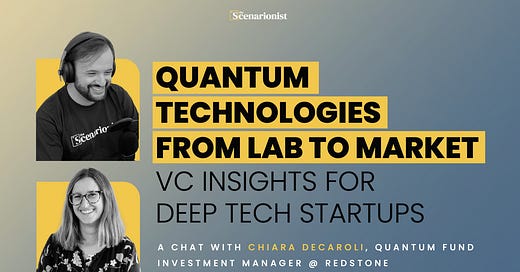Welcome back to Deep Tech Catalyst, the channel by
where science meets venture!Today, we're excited to introduce Chiara Decaroli, Quantum Fund Investment Manager at Redstone!
In our discussion, we delved into the journey from lab research to practical applications, emphasizing the crucial milestones quantum technologies are achieving as they enter the business world.
This episode focuses on the synchronization between development and investment phases, intriguing use cases, and the essential elements quantum startups need to secure their first investments.
In detail, you’ll discover:
🤖 Commercialization of Quantum Technologies
🎯 Unique Advantages of Quantum Computing
📈 Investment Dynamics in Quantum Technologies
🚀 Market Validation and Case Studies in Quantum
🤔 Key Factors VCs Consider in Early-Stage Quantum Startups
KEY INSIGHTS FROM THE EPISODE
🤖 Commercialization of Quantum Technologies
Quantum technologies are based on manipulating single quantum particles such as atoms, electrons, or photons. This manipulation has applications across 3 main verticals: computing, sensing, and communication.
Computing: Quantum computing can perform calculations more effectively than classical computers and solve problems currently impossible for classical systems.
Sensing: Quantum technology allows the detection of electrical or magnetic signals at scales unachievable with current sensors due to the heightened sensitivity of quantum particles.
Communication: Enhancing security for data encryption, making systems resilient to cyberattacks.
A significant step in quantum computing commercialization was in 2016 when IBM launched the first quantum computer on the cloud, transitioning quantum computing from the lab to the commercial sector. Since then, startups focusing on hardware, software, and middleware development have proliferated. Fast forward 5 to 7 years, venture capitalists and governments have been heavily investing in this field.
🎯 Unique Advantages of Quantum Computing
Quantum Computing represents a radical departure from traditional computing methodologies. Conventional computers utilize transistors and operate on a macroscopic scale, dealing with streams of electrons.
However, as transistor sizes continue to shrink, reaching the nanometer scale, they begin to function at subatomic levels, introducing quantum mechanical properties into classical computing devices.
This evolution toward quantum particles, or qubits, necessitates a complete overhaul in the manipulation and control of these particles due to the distinct laws of quantum mechanics.
Quantum Computing is captivating because it can handle complex problems with vast amounts of variables and constraints that are currently unmanageable with classical computers. It excels in simulating quantum systems naturally, such as atoms and molecules, which makes them ideally suited for chemistry and material science applications.
For instance, if we consider the medical field, tracking every single atom in the human body is beyond our current capabilities. In pharmaceuticals, simulations of molecular interactions are drastically simplified, leading to extensive trial and error in drug development. Quantum Computing could revolutionize this process by enhancing the accuracy and efficiency of these simulations, potentially reducing both the time and cost significantly.
Another critical area is optimization, where quantum computers can solve large, complex problems more efficiently. This capability extends to various sectors, including logistics, finance, and weather forecasting.
The potential of Quantum Computing extends beyond just technical applications; it promises to redefine market dynamics and demand across multiple industries. For scientists and entrepreneurs, understanding these emerging market trends is crucial.
This technology is not merely a niche within deep tech but a transformative force with the potential to impact a broad array of fields, much like computers have done across all industry sectors.
📈 Investment Dynamics in Quantum Technologies
Venture building within the realm of quantum technologies presents unique challenges and opportunities, especially when aligning the stages of technology development with investment phases.
From an investor's perspective, there are interesting case studies to consider where companies at earlier technological stages, such as TRL3, might attract significant investment compared to their counterparts in Deep Tech, due to the groundbreaking nature of their innovations.
Often, the founders of quantum technology startups emerge directly from academic research settings, having spent years, sometimes even a decade or more, exploring specific problems.
These individuals or research groups typically advance their technology with university support and grants and may secure intellectual property (IP) rights, which is highly advantageous. At a certain point, these researchers might recognize their project's potential beyond pure research, viewing it as a viable prototype that could meet emerging market demands—even before acquiring commercial customers.
This recognition usually prompts the spinout from the laboratory.
At this stage, the startup might only have a concept or a minimal viable product (MVP) developed from their academic endeavors. They are often considered pre-seed or seed stage at this point, focusing initially on product validation and development. As these startups progress, typically through the early funding rounds like Series A or B, they might begin to see some commercial traction.
The journey from an early prototype to a marketable product can be markedly different in quantum technology compared to more conventional tech sectors.
For instance, due to the complexities of quantum hardware development, securing well-protected, innovative IP and a competent team can make a startup particularly attractive to investors. This is crucial because, unlike software as a service (SaaS), quantum technology startups might need substantial upfront investment to refine their technology and scale up computational power before even approaching potential customers.
This longer development timeline and the high technological complexity require a different investment approach. Investors in quantum startups often engage early, driven by the transformative potential of the technology, even though the path to market can be prolonged and intricate. This approach contrasts sharply with sectors where product development cycles are shorter and market entry happens more rapidly.
🚀 Market Validation and Case Studies in Quantum
Quantum Communication
Take KETS Quantum Security, a startup originating from a research group at the University of Bristol, UK, specializing in integrated photonics for quantum communication—specifically quantum key distribution (QKD).
As of their pre-Series A stage, KETS began to experience their initial commercial traction, including signing contracts for several units.
This early success demonstrates a market need for their specialized quantum communication hardware, even in the nascent stages of their business development.
Quantum Computing
In contrast, quantum computing presents a more challenging scenario for early-stage commercialization due to the complexities and nascent state of the technology.
Quantum computing startups, for example, might focus on perfecting small-scale quantum machines. Although these machines are currently limited in commercial application, they offer significant exploratory potential for future use cases.
Startups often make these quantum computers accessible via cloud platforms, such as Amazon's AWS, allowing end users to experiment and determine potential applications within their operations. This model enables startups to monetize their developing technology by providing access to their quantum machines, even though these are far from being the final products.
It represents a strategic way to generate early revenue and validate the technology with real users, even amidst ongoing technical R&D.
📈 Key Factors VCs Consider in Early-Stage Quantum Startups
In the quantum sector, investors' criteria can vary significantly. However, the key indicators typically include:
Secured patents (IP),
Technological validation from credible external sources,
Strategic partnerships or collaborations,
Initial sales or contracts,
User feedback from early access programs.
Each of these elements contributes to building a strong case for the viability and market potential of the hardware or software solutions.
Hardware Startup Considerations
For companies focused on hardware, especially those developing essential components for quantum computers, the path to commercialization can be relatively shorter. These companies can directly target existing quantum computing companies as their primary customers, offering critical components for building quantum machines.
This sector-specific approach allows for quicker market entry compared to companies developing complete quantum computing systems.
In this segment, significant emphasis is placed on the founding team's credentials and their research background. A proof of concept or a reliable prototype system is crucial, alongside any intellectual property (IP) that the team has developed or plans to develop.
Given the competitive and mature landscape of quantum computing hardware, aspiring Deep Tech founders must demonstrate a unique value proposition to attract investment.
Software Startup Considerations
For software-based companies in the quantum realm, the approach slightly differs, although many principles remain the same.
These companies often develop hybrid solutions that combine classical and quantum computing, providing immediate value while gradually enhancing their quantum capabilities.
The importance of interdisciplinary teams is crucial, incorporating expertise from various fields such as finance or chemistry, to tailor quantum algorithms to specific industries. Moreover, a thorough understanding of the different quantum hardware platforms is essential to optimize software performance and compatibility.













